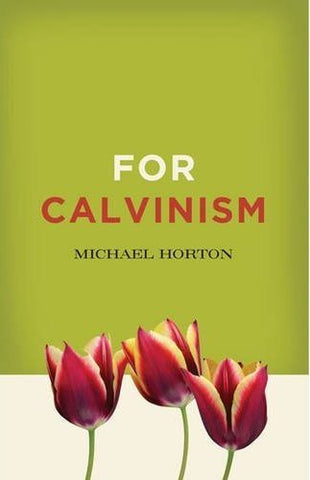by Michael Horton
ISBN 978-0-310-32465-2
Published by Zondervan
Reviewed by Clint Walker

John Calvin walked the earth over 500 years ago. His Institutes of the Christian Religion still remains as the standard of systematic theology. One may agree with Calvin or disagree with him, but it is very hard to ignore his contributions to theology, church practice, and the development of Protestant Christendom.
At sometime after Calvin lived and developed his theology and ministry, people began to refer to themselves as "Calvinists". As "Calvinism" developed, it came to be defined with five certain viewpoints most clearly articulated by the Synod of Dordt in response to the rise of Armenianism. These five viewpoints are commonly summarized with the acronym TULIP, which stands for total depravity, unconditional election, limited atonement, irresistable grace, and perseverance of the saints.
Michael Horton, in his book For Calvinism does a great job of defending what has been labeled as Calvinist beliefs (although he would say Calvinist beliefs should be associated with orthodox Christianity before they are associated with a sect of Christianity called "Calvinism"). Horton spends the first half of the book defending what was articulated in the Synod of Dordt, although he prefers other language than what the TULIP acronym necessitates. He spends the second half of his defense of Calvinism addresssing particular concerns with how Calvinist belief is practiced in the church and in the lives of individual believers.
Calvinist belief is often unfairly caricatured. In addition to this, many of Calvinism's strongest proponents come across as very stern and angry. The strength of For Calvinism is Horton's ability to articulate Calvinist thought in a kinder, gentler manner without compromising the convictions he is representing.
Horton commends Calvinist thought by highlighting parts of Calvinist doctrine that other people ignore. For example, in regard to total depravity, Horton says, "Reformed theology never starts with the fall, but God's good creation" (p. 38). When Horton commends creation in this way, he at one time corrects a stereotype about Calvinism (that God made persons to sin), and describes how "free will" fits into a theology of complete divine sovereignty.
Over and over again, Horton continues to address stereotypes against Calvinism without compromising Calvinist doctrine. In relationship to unconditional election, he says that God does not arbitrarily "drag some people into heaven kicking and screaming, while telling others who want to be saved that they are simply not on the list" (p. 57). He discusses the doctrine of limited atonement in terms it "extent" and "nature" (p.80ff). Also, Horton's chapters about living the Calvinist faith defend Calvinism against many erroneous ideas. Many say that a Calvinist cannot believe in missions or evangelism. For Calvinism takes a whole chapter to destroy this myth.
For Calvism is a very informative book. As is its partner book Against Calvinism by Roger Olson. And with the rise of "New Calvinism" in American Christianity, it will be more and more important for Christians and church leaders to be conversant on issues of Reformed and Armenian theology. Horton may be one of Calvinism's best advocates, and one of its more clear communicators to everyday lay persons. For these reasons, I cannot commend this book more highly for anyone interested in such theological concerns.



No comments:
Post a Comment